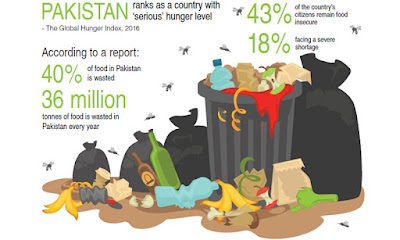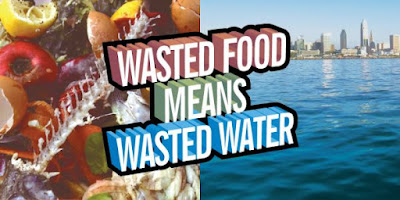 |
| Food waste and Its Effects (Source: Dawn.com) |
Food that is not consumed or used is considered waste. One of such nations that experiences food waste in Pakistan.
Despite being a third-world nation, Pakistan unfortunately
also experiences hunger and malnutrition.
Food waste is a global issue, not just a problem in one or
two nations. Globally, one-third of the food produced is wasted before it
reaches our plates.
If conserved, the food that is wasted globally each year
could feed 3 billion people.
A person who refuses to eat is not guilty of sin, but if
they waste food, they must answer to Allah Ta'ala.
Let's examine what constitutes Food Loss and Waste
Although the phrases food loss and food waste may appear
similar, they are not the same. The earlier stages of production, such as
harvest, storage, and transportation, are referenced by the term "food
loss." While food waste refers to food that is fit for human consumption
but is frequently thrown away by consumers or general retailers.
Many of us are unaware of the damaging effects discarded
food has on the environment. You may read about how food waste harms the
environment in this article.
Food and water waste are the same
These freshwater resources are rapidly depleting, just as the increase in demand from the world's millions of hungry and thirsty people.
Every step of the food production process, including irrigation,
spraying, pouring, and other methods, uses a significant amount of water. Water
is also essential for feeding fish, birds, and cattle.
Therefore, in addition to throwing away food, we also waste the gallons of water needed to cultivate and maintain plants.
Millions of
tonnes of water are utilized to produce the fruits and vegetables we consume,
and because meat and poultry consume large amounts of water, they are the
biggest consumers of water. Every crop has various water requirements, just as
every animal does.
Last but not least, it is estimated that agriculture
uses 70% of all freshwater.
Causes of Food Wastage
Food is frequently wasted because it is bought or prepared in excess. It is evident that extra food on the plate will be wasted if one buys or prepares more food than is necessary.
Food that goes to waste in these
situations is made up of leftovers and food that has only been partially
consumed.
Alternately, the partially used food may occasionally be sent to the refrigerator's back and never used. The same holds true for extra purchases that wind up going bad since they are past their expiration dates and no longer look, taste, or smell good.
All of the extra food ultimately becomes
waste food.
2. Excessive food preparation in restaurants, hotels, and the food service sector
The majority of restaurants, hotels, and the food service sector all have a trend to prepare/produce meals in excess.
While the aim is great, especially in light of the likelihood that business will be brisk and the need to avoid running out of food options, over-preparation frequently results in waste if all of the food isn't consumed.
Overproduction in the food
industry is the main contributor to food waste.
The kitchens continue to produce amounts that are believed to be sufficient, but the majority of it is actually not needed because the food service operations are unable to measure the average amount of food consumed.
Additionally, while some managers think manufacturing food in bulk will reduce costs, it actually produces more waste when compared to cook-to-order preparation or cooking in smaller batches.
3. Overselling and overordering in supermarkets and food stores
Food waste is frequently caused by the over-merchandising of food products and items in supermarkets, wholesale marketplaces, and retail outlets.
In order to increase sales and customer happiness, foodservice
operations are frequently more focused on over-merchandising in grocery shops
and supermarkets by employing stunning and alluring displays.
Excessive merchandising to higher food waste is an underappreciated issue.
When consumers purchase more than they require, the
extra frequently ends up in the garbage. The expiration of food products with a
short shelf life is another consequence of overordering because some of them will
go unsold.
Effects of Food Waste
1. Starvation and Hunger
Hunger and starvation are the biggest and worst consequences
of food waste.
The amount of food wasted worldwide each year results in an
almost 4-fold increase in the total number of people who are hungry.
People who carelessly toss food away never consider that
there may be some who haven't had a piece of bread in days.
Every day, approximately 1 in 8 people must go to bed
hungry.
2. An Increase in Food Prices
Food prices are rising because more food must be produced to
make up for wasted food.
Food demand is rising, which causes markets to run out of
commodities. As a result, individuals turn to the black market, which drives up
the cost of items.
As a result, the buyer must go home without any purchases.
The food industry is severely harmed by it.
3. Biodiversity is harmed by food waste
The term "biodiversity" refers to the whole range
of life found among various species and types of organisms in an ecosystem.
Deforestation is done in order to raise or grow cattle.
This has an impact on
our native flora and animals. The more natural area is converted into pastures as
the number of animals increases. The more sheep graze on a piece of land, the
less arable it becomes. Land loses its natural diversity and variety.
We catch a lot of
marine fish without considering how their population decline may impact our
biodiversity. These fish are then rejected by businesses because they don't
satisfy their quality standards, are thrown out by customers, or are otherwise left
to decay in a truck.
Solutions To food wastage
Priority should be given to harmonising food production with demand in order to lessen the issue of food waste. The first step is to reduce the number of natural resources used to produce food.
Tools for risk management
can be used in lodging, dining, and the food service sector.
Such technology will help to ensure that chefs and supervisors only prepare food in response to customer orders or demands. Food waste has always occurred when vast quantities of food are produced.
Therefore,
hotels and the entire foodservice sector should focus on the manufacturing of
small batches or employ the cook-to-order option in an effort to conserve food,
labour, and money.
2. Initiatives to reduce food waste
In order to lessen food wastage and loss,
supermarkets, retail food establishments, large restaurants, and individual
customers can all cooperate together. Individual consumers, for example, can
reduce their food footprint by not always prioritising the highest food
quality.
Occasionally, even unsightly or imperfect food products are
still acceptable or can be bought and utilised to prepare dishes like soups. To
reduce food waste, over-merchandising can also be minimised.
3. Buying and preparing meals with a plan by consumers
The utilization of meal planners when cooking can
significantly reduce food waste. To limit the amount of food that is wasted
because of expiration after lengthy storage periods, consumers should only
purchase food in accordance with their plan or in small amounts.
Conclusion
Food waste is becoming a major concern, particularly for
poor countries that are already struggling with issues like poverty, hunger,
starvation, and malnutrition.
Food waste during parties, feasts, and hotels and
restaurants contributes significantly to the amount of food that ends up in the
trash.
Additionally, food waste during food processing is bad for a
country.
Therefore, we should modify ourselves in order to change these tendencies.







Good Job with this one...waise toh i don't waste food very often ab se jo waste hota hai woh bhi nai hone dunga.. IN SHA ALLAH
ReplyDelete